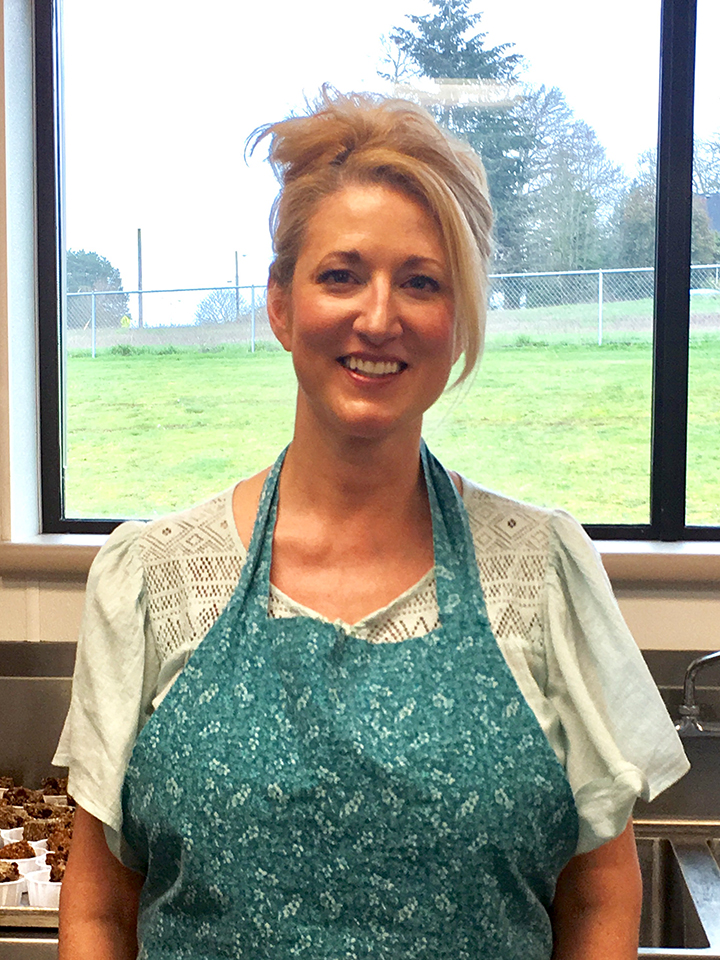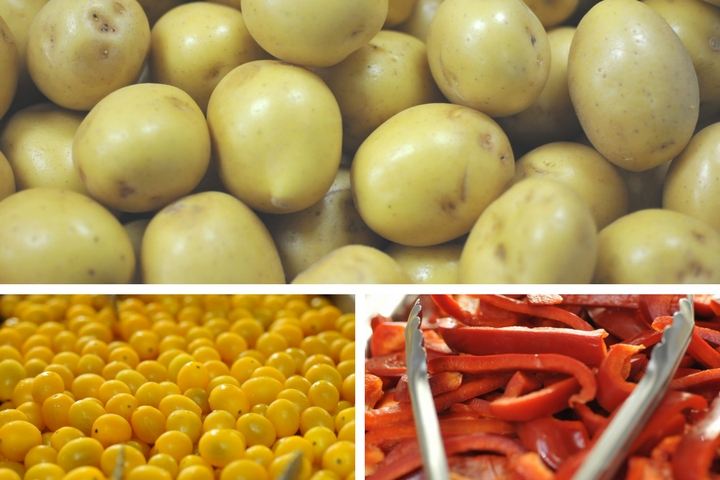First photo, from left: Joni Morin, Nancy Colouris, Shana Foote and Becky Brown, nutrition services staff members, prep Yukon potatoes for Farm Fresh Friday. Second: Emma Boyer, a second-grader at Franklin Elementary School, makes a lunch selection. Third: Theodore Unruh, right, enjoys lunch at Franklin Elementary School. Fourth: Efforts to feature fresh fruits, vegetables and ingredients are evolving school meals.
Fresh fruits and vegetables transform tastes
Krissy Schaberg remembers school lunches as a student, when nearly everything was frozen or canned. Like many adults who used to eat at school, she doesn’t have much reason to be sentimental.
But times have changed. Now, said Schaberg, “I’m impressed, as a parent, at the Vancouver lunches. I didn’t know how much thought they put into it until I started working in the cafeteria.”
Unlike many districts that use contractors, Vancouver Public Schools operates its own food service program, with the support of the school board and administration. Where others rely on processed foods, VPS makes many items from scratch. And programs that highlight fruits and vegetables are evolving the way that school lunches look, smell and taste.
Eleven thousand lunches
Parents of young eaters know that dinner can sometimes be a battle. Cooking becomes strategy: not about what tastes good and is healthy but what the child will eat. Now add in rigorous dietary guidelines for just about every component of a meal, even condiments, and you begin to realize the difficulty of menu development in a school setting.
“Eleven thousand lunches [per day], trying to please everyone—it’s hard to do it at your own house, let alone how many families we come in contact with,” said Mari Ovens, the director of nutrition services, who also is a registered dietician.
Focusing on fresh fruits and vegetables is not only a way to meet the complex U.S. Department of Agriculture guidelines, which the district exceeds, but also support local farms in Washington and Oregon, broaden palettes and promote healthy eating habits.
VPS schools began hosting monthly Farm Fresh Fridays in fall 2016 with a grant that Clark County Public Health received from the USDA. These special lunches present students with both the familiar, such as apples and potatoes, to the more exotic, such as rainbow chard. The district’s Fruit of the Month program similarly introduces students to new foods, and monthly Try It Days encourage exploration of unfamiliar tastes such as the now-popular kale chips.
Franklin Elementary fifth-grader Adrienne Knight, who typically eats school lunches, is one of the students who made positive discoveries. “Like jicama—I tried it here and I really liked it,” she said.
That roughly half of the district’s students receive free or reduced-price meals is no guarantee that these initiatives will be successful. “Kids’ tastes have become much more sophisticated,” said Ovens. “They expect things to be fresh and taste good. It’s not that they’ll eat whatever is offered. It has to meet pretty high standards to be appealing to kids.”
More than cooking
The nutrition services staff at Discovery Middle School arrives at 5:30 a.m. On a Thursday in late February, the crew was busy slicing Yukon potatoes and easing them into a saltwater bath in preparation for Farm Fresh Friday.
The next day at Franklin Elementary, a smaller satellite school that receives prepared food from Discovery, Schaberg greeted every student who passed through the line by name. That familiarity is more than just osmosis.
“I think it’s really important to remember their names. I think people feel more special when you remember them,” said Schaberg.
Her commitment to influencing students positively extends beyond just breakfast and lunch. Schaberg oversees a small group of students who volunteer in her kitchen: preparing food, cleaning, doing dishes, putting away groceries.
Sometimes the influence of the staff means recognizing a student who needs help. “We get involved with these kids. We get involved with the staff,” said Nutrition Service Manager Terri Adams, who appreciates that her Discovery Middle School colleagues respect and involve the kitchen staff in matters beyond the cafeteria.
After all, every adult at school can affect a student’s life. Working in a school kitchen: It’s more than just cooking.
Food for thought.
Fresh fruits and vegetables
Since the 2010-11 school year, students in Vancouver schools have enjoyed more than $710,000 worth of fresh fruit and vegetable snacks. As a result of a grant-funded program, the students have opportunities to try a range of foods, sourced locally whenever possible, including papaya, mango, starfruit, asparagus and fennel. The recipient schools have high percentages of students who are eligible for free or reduced-price meals.

#TeamVPS: Krissy Schaberg
Cafeteria assistant
Franklin Elementary School
Years with VPS: 2.5
One thing I’ve learned:
Being kind to others can go a long way!
Three words that describe me:
Positive, reliable, happy.
When I’m not working:
I love the Northwest and the four seasons (although this has been a really long winter!). I enjoy hiking, walking my dogs, cooking and reading. My favorite thing to do is spend time laughing with my husband, kids, family and friends!




